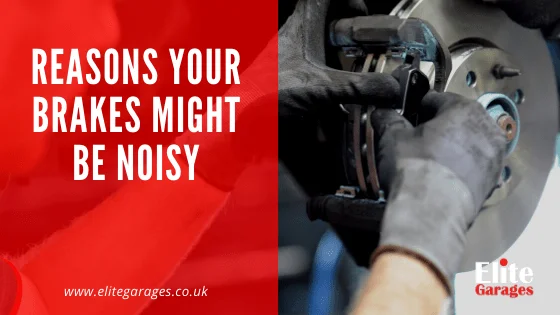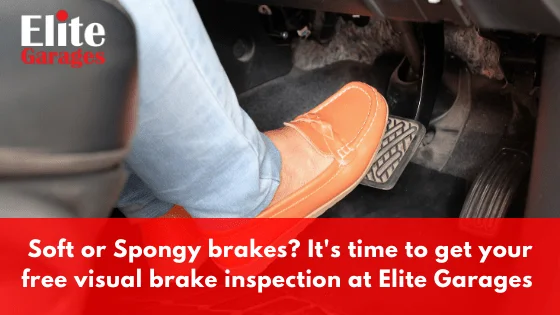
Diagnosing Noisy Brakes
Noisy Brakes: One of the most common questions we get asked is, “Why are my brakes squeaking?” Considering that brakes are an essential part of the car, you should never ignore unusual brake noise. While squeaking or grinding sounds can be annoying, they also serve as a warning that something may be faulty.
Brake noise alerts us of potential danger and it’s always best to err on the side of caution and get it checked by a trusted mechanic. At Elite Garages, we offer a FREE visual brake check to make sure all systems are in good working condition. If something is amiss, you can quickly and easily book a car service to fix the problem at hand.
How Do Car Brakes Work?
Without getting too technical, when you push your foot against the brake pedal, it controls a hydraulic piston. Inside the piston is fluid which causes a calliper, attached to a pair of brake pads, to put pressure on a disc. This process gradually slows down the wheels and will eventually stop your car.
The harder you apply pressure to the brake pedal, the faster you will stop while lighter pressure results in a gradual stop. Braking should only create minimal noise from inside the car but worn or damaged brakes could cause a number of unnerving noises.
Brake Rattle
A brake rattle often occurs when you let up off the pedal where you may suddenly hear a rattling noise. Interestingly, some have compared this noise to the sound it makes when shaking a can of spray paint. The most common cause of rattling brake noise is the pads which are not necessarily a major concern.
It’s normal for brake pads to sometimes rattle due to heat expansion but it should never be consistent and certainly not while your foot is on the brake pedal. When this happens, you should have a professional check your brakes as it could be the sign of something serious.
Grinding Brake Noise
Regardless of the type or severity, brake grinding is always a cause for concern and should be dealt with immediately. The two major causes of grinding brakes are as follows:
Brakes make a loud grinding noise when pressing the pedal
More often than not, this is caused by the disc making contact with a part of the calliper. This is typically associated with extreme wear to the brake pads or rotors. Don’t wait until you hear the grinding noise before servicing as it will be a much more expensive repair.
Brakes make a grinding noise due to a foreign object
When something like a stone gets lodged in the calliper may also result in a grinding noise. In this scenario, the brakes usually make a consistent grinding or screeching sound whilst in motion. While you can try to dislodge the object by repeatedly moving the car backwards and forwards, if it doesn’t work, you need to service your brakes. Ignoring a foreign object is a big mistake as it can result in severe damage and a costly repair bill.
Metal-on-Metal Grinding
The moment you hear any noise sounding like metal grinding against metal, you should at least get your brake pads or discs s examined. At this point, chances are that you may actually have to replace some of the parts. Most brake callipers have a soft metal piece fitted to act as an early indicator that the pads need to be replaced.
A more metallic grinding noise could mean that the brake pads have been worn all the way down to the metal. The noise is a result of them coming into direct contact with the brake discs. This can damage the rotors and seriously compromise the effectiveness of your brake system.
Fading Car Brakes
“Brake fade” refers to a condition where the brakes become overheated and they no longer function as they should. It is most common when you use the brakes much more than usual with going down a long, steep hill as a prime example. With a brake fade, you need to apply extra pressure to the pedal for the same braking power.
How to prevent a brake fade
The best way to prevent brake fade is to use “engine braking” techniques. This requires using lower gears so that the engine and drivetrain control the speed. In extreme situation, it’s best to pull over and allow the brakes to cool before setting off.
If you think you have a brake fade, you can perform a pressure check on your braking system. This will ensure that the hydraulics on your brake system is working as they should. Pump the pedal a few times while the car is stationary and the pedal should become firmer with each pump. If it doesn’t work and the brake pedal feels ‘mushy’, we recommend getting it checked out as soon as possible.
Rear Brake Noise
Another brake noise you may hear is one that comes from the rear and this will be the drum brakes. Some cars have drums instead of discs which is the likely cause of the noise. Here, a brake shoe presses against the rim on the inner edge of the drum of the wheel when engaging the handbrake.
This results in less pressure when pulling the handbrake than pushing down the brake pedal which means the brake is engaged for longer than your front brakes. If your car has been standing still for some time, small rust particles can build up on the outer drum and the surface.
The only way to resolve this is by skimming the drums at regular intervals. This will essentially grind down the pitted and debris-covered outer surface to give a smooth new layer on the outer drum.
Knocking Or Thumping Noises
Knocking or thumping sounds may be the result of a tiny groove on the surface of the brake drum by regularly applying the brake. Think of a vinyl record which is exactly what the surface of the drum could look like.
When the brake shoe makes contact with the worn surface, it can break away from the metal and hit the backing plate. The best solution is to replace the rear drums even though it’s a longer and more expensive job than replacing the front pads.
Recommended: ‘Driving Habits That Can Damage Your Car’
Never Ignore Brake Noise
It’s a known fact that many drivers ignore noisy brakes, especially minor brake noises or irregularities for too long. This can easily lead to a dangerous situation where your brakes don’t respond fast enough in an emergency. Faulty or worn brakes are a common cause of accidents which could have easily been avoided.
At the same time, ignoring your noisy brakes, or really any other part could mean that your next car service will cost much more. By neglecting to address the issue, not only do you put yourself and other road users at risk but your budget will also feel the pinch.
Final Thoughts
Pressing the brake pedal should give you a sense of safety knowing that your car will slow down in time. However, hearing noisy brakes and the car pulling to one side can put a spanner in the works. Brakes are one of the most essential components in your car and should be treated as such. Don’t wait for the grinding or knocking sound before taking action; a brake check could save your life!
Brake pads should be replaced after approximately 50,000 miles but some as early as 25,000. Depending on how you drive and the type of brake pads fitted, it can last for up 70,000 miles. We always recommend checking your owner’s manual for a more accurate number based on your car’s specific requirements.
Free Brake Inspection At Elite Garages
Noisy Brakes: If you suspect anything is wrong with your brakes, regardless of how small it may seem, book a FREE Visual Brake Check at any of our Elite Garages. All technicians across our 13 retail branches are expertly trained to offer you the best possible advice and service, and are fully trained to ensure a professional brake repair.
Besides brakes and safety checks, Elite Garages also offer car services at great rates, MOTs, tyres, batteries, shocks, clutch repairs, exhausts and wheel alignment. To confirm our commitment to you, remember the ‘Elite Price Promise’.
“If you find a genuine printed cheaper price for the same product which is in stock we will meet or beat this price at the time of purchase.”
Don’t take our word for it, here’s what some of our valued customers had to say about us.
About Us
Opening Times
Saturday : 8:30–4:00
Sunday : closed
More Information
Contact UsCustomer Information Pack
Check MOT Due Date
Free MOT reminder
Careers



